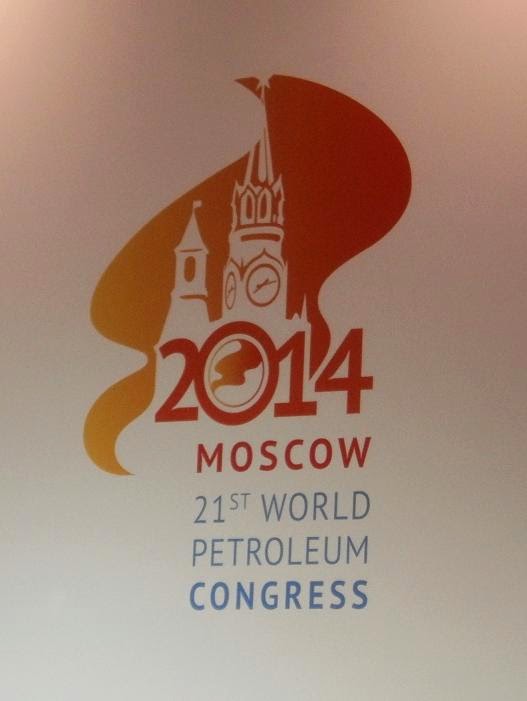 The Oilholic has been tweeting like mad from the 21st World Petroleum Congress over a hectic few days, though not all of the chirps are 'crude' of course.
The Oilholic has been tweeting like mad from the 21st World Petroleum Congress over a hectic few days, though not all of the chirps are 'crude' of course.
Away from tweeting today, one found an opening to talk to members of the Iranian delegation who are using the Congress – their first since a partial lifting of sanctions – to declare the country's oil & gas sector open for business. The aim is to bring in more foreign investment and technological know-how, in wake of securing limited international sanctions relief from a November interim agreement to temporarily curb its nuclear activities.
Setting out its stall, the National Iranian Oil Company (NIOC) has floated the idea of 41 projects aimed at the development of oil & gas fields, establishment of natural gas liquid (NGL) plants, and the collection of ancillary petroleum gas at oilfields. The latter project slant is of great significance, as the Iranians usually burned off the gas in the past due to lack of infrastructure, rather than tap it as an additional resource.
The total valuation is in the region of US$100 billion, as confirmed by an NIOC official and a new contractual framework is on the table. According an official, under the terms of the previous buy-back contracts, the said contractors were a set price for oil & gas produced. Under the planned new system (the Iranian Petroleum Contract), state-run energy companies will establish joint ventures with their international counterparts, which will be paid with a share of the output.
All sounds clear enough, but unless the sanctions are lifted further, one doubts how international players can circumvent the existing sanctions and proceed anyway. Nonetheless, there seems to be a very relaxed atmosphere within the Iranian camp here in Moscow, who are at the forefront of making their country's pitch. And there is some bluster too as usual.
Iranian Oil Minister Bijan Namdar Zanganeh has said that the country's oil industry would go ahead with the projects, with or without sanctions, which have "not hindered progress." The Oilholic doubts that, but agrees with Zanganeh's assertion, back in April, that in order for Iran to revise how it regulates oil & gas contracts further, sanctions must be lifted more meaningfully.
Companies are still queuing up though led by CNPC, Gazprom and Petronas. The Oilholic can confirm Eni and Total are also in talks with Iran, according to a senior source. However, US oil & gas majors are largely staying away and BP is understood to be "monitoring the situation" with nothing concrete having materialised so far. With proven reserves in the region of 360 billion barrels of oil (boe) equivalent, there is a lot at stake, so watch this space!
Among what the country holds, the Northern Iranian states should be pretty interesting, according to Farrokh Kamali, a recently retired technical advisor to the Iran LNG Company. In 2011 and 2012, Iran found potential for 10 billion barrels of crude and 5 trillion cubic feet (tcf) of gas in its territory of the Caspian Sea. Kamali describes the findings as "economically viable".
Meanwhile, the Indians are making waves too. People turned up in their hordes to hear what the newly appointed Minister of State for Petroleum and Natural Gas Dharmendra Pradhan had to say about the Narendra Modi government's planned revision to India's highly political subsidy system, which if significantly altered, could aid investment in the country's oil & gas sector.
First off, Pradhan stressed on the ties and friendship between Delhi and Moscow. Secondly, he noted that energy policy must serve broader economic growth and its benefits should not exclude "the poor and the vulnerable." Thirdly, he noted that the oil & gas industry's efforts must focus on promoting fiscal and regulatory regimes that are stable and equitable to both investors and owners of natural resources.
Fourthly, he called for enhancing technological collaboration across the value chain since the nations have to "delve deeper" and explore in more difficult areas for hydrocarbons. And then he left! Some were disappointed with Pradhan, but the Oilholic wasn't. A new minister, in a new government was hardly going to go down the path of saying something beyond the box – that's India, correction politics, for you.
Sticking with India, a Bharat Petroleum official gave fascinating insight into how the company is improving surveillance of its vast pipeline network. Manoj Kumar Jadhaw, manager of pipelines at the Indian state-owned company, said they are trialling a GPS tracking system for their 'line walkers' to ensure the walkers are actually walking and monitoring (and not skiving) along the length of the pipeline to prevent resource tapping or pilferage, a common occurrence in that part of the world.
Initial feedback has been great but the project only extends to 300km. When you are talking 40,000km of pipelines, there's some way to go yet! That's all from Moscow for the moment folks! Keep reading, keep it 'crude'!
To follow The Oilholic on Twitter click here
To follow The Oilholic on Google+ click here
To email: gaurav.sharma@oilholicssynonymous.com
To follow The Oilholic on Google+ click here
To email: gaurav.sharma@oilholicssynonymous.com
© Gaurav Sharma 2014. Photo: National Iranian Oil Company enclosure at 21st World Petroleum Congress, Moscow, Russia. © Gaurav Sharma, June 2014.

















